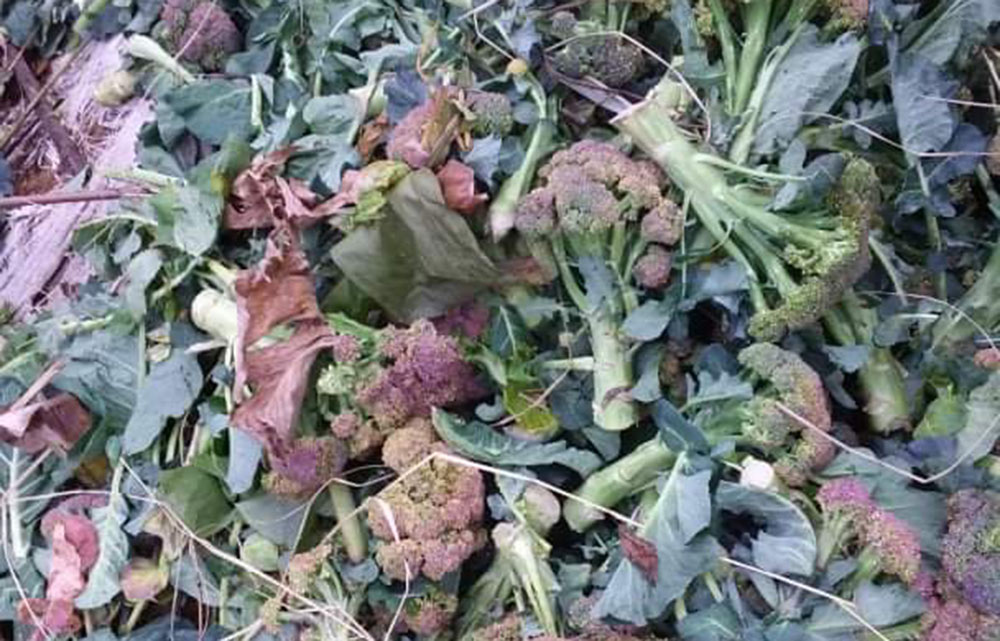Choki Wangmo | Tsirang
Lack of information and coordination among authorities are impacting Dagana vegetable aggregators, resulting in huge losses.
A vegetable aggregator from Gozhi, Tika Tshering, said he collected vegetables from the locality and started his journey to Centenary Farmers Market in Thimphu on January 30.
He had a negative Covid-19 antigen test result with him.
“But I was not allowed to proceed further from the Sunkosh checkpoint,” Tika Tshering said. “I was asked to produce a negative RT-PCR test result.”
He returned to Dagapela hospital. He has already wasted three days.
“I have the vegetables still loaded in my pick-up truck,” Tika Tshering said.
He was allowed to travel after three days, but vegetables worth Nu 50,000 were damaged by then. “I couldn’t sell 500 kilograms (kg) of broccoli and 300 bundles of spinach. I fed them to cattle.”
Dagana dzongkhag, with a focus on winter vegetable production, has been able to supply local vegetables to other dzongkhags in recent times, but harvested produce from Tsendagang and Gozhi gewogs were damaged this time.
According to Gozhi gewog agriculture extension officer, Puran Lama, each household in the gewog lost about 400kg of vegetables, mostly cauliflower and broccoli, due to three to four days’ delay caused by the Covid-19 protocols.
“Transporting produce was challenging. Traffic officials from Gozhi allowed aggregators to travel but officials at the Sunkosh checkpoint sent them back,” he said.
With a comparatively higher population density, the two gewogs are the highest vegetable producers in the dzongkhag. About 50 households in Gozhi gewog have grown vegetables on 30 acres of agricultural land.
Another vegetable aggregator, Chabilal Yonzen, who was also sent back from the Sunkosh checkpoint, lost about 480kg of vegetables within three days.
Others like Pem Tshering lost 500kg of vegetables due to a week’s delay in receiving a travel permit during the lockdown, and Dilip Bista Chhetri incurred a loss of Nu 32,000.
An aggregator from Tshendang, Hochu Leki, said that without information from the authorities concerned, they collected vegetables and then were left helpless when they did not get travel permits due to delays in RT-PCR test results. “After hearing about issues in the movement permit, I did not harvest.”
A driver, Dhan Kumar Subba, who was transporting mandarins to Gelephu, could not travel since there were no escort services from the dzongkhag yesterday, because the one-week validity of his RT-PCR test results ended yesterday.
He was frustrated. “If I could travel today, I could have returned the same day. Now I have to wait another day for the results.”
He said that truckers understood the challenges during such times as Covid-19, but authorities should understand that transporting perishable goods was challenging too. “Since there were escort services daily in the past, we thought it would be available every day.”
The drivers alleged that changes in protocols were not communicated to the individuals involved, and this resulted in losses.
Eight vehicles were stranded at the Sunkosh checkpoint without escort services. Aggregators said escort services have become irregular.
“We heard that there are no de-suups to provide escort services,” Dhan Kumar Subba said.
The incident commander of the dzongkhag Covid-19 taskforce, Duba, said that as per the instructions from the National Covid-19 taskforce, all drivers require RT-PCR test results. “We couldn’t facilitate them, and there were delays in issuing travel permits.”
He said that it takes a 24-hour turnaround time to get the test results.
Dzongdag Duba, however, said that only some aggregators incurred major losses. “Even if we allowed them to travel, they would be stranded on the way without the RT-PCR test results.”


